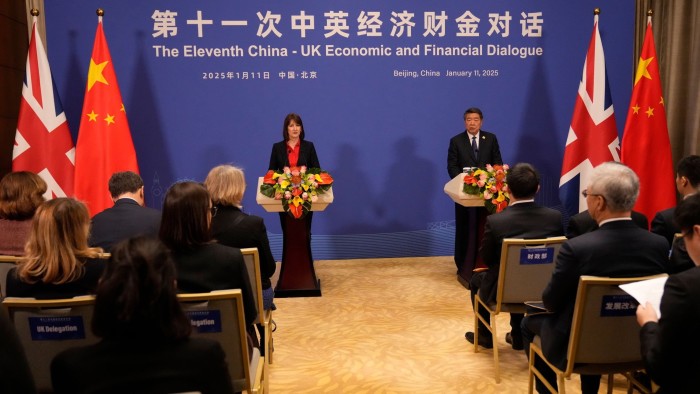The UK and China will study the feasibility of establishing exchange traded fund and wealth management connect schemes to link the capital markets of the two countries.
The announcement by the UK government follows UK Chancellor Rachel Reeves’ visit to Beijing last week.
As part of efforts to improve economic ties with China, the UK government said that both sides had “committed to further their financial services relationship” and would “deepen co-operation” in wealth management by studying the feasibility of establishing a UK-China Wealth Connect.
It added that the governments would also assess the feasibility of setting up an UK-China ETF Connect scheme to improve capital market co-operation, and welcomed the increased number of UK subsidiaries of Chinese asset managers listing ETFs in London, including those dominated in renminbi.
The UK government said it welcomed recent licences and quota allocations China had granted to UK companies, including HSBC, Schroders, Abrdn and Aspect Capital.
Aspect Capital secured a private fund management licence in December, while Schroders won the final go-ahead to commence its wholly owned fund management business in China in 2023.
The UK delegation to Beijing included representatives from Abrdn, Fidelity, HSBC, London Stock Exchange Group, Prudential, Schroders, and Standard Chartered, a source familiar with matter told Ignites Asia.
The announcement also outlined plans to further enhance the UK-China Stock Connect and for the launch of a UK-China over-the-counter bond business.
A Shanghai-London Stock Connect scheme was launched in 2019, allowing investors to conduct trades in different time zones across the two bourses but has not garnered the size of cross-border flows that many might have hoped.
Speaking at a joint press conference with China’s vice-premier He Lifeng on January 11, Reeves said the two countries had signed agreements worth £600mn that represented “pragmatic co-operation” on financial services, trade, investment and the climate.
Reeves added that London was a “natural home” for China’s financial services companies to raise capital, and as a “launch pad” for Chinese companies to build a global footprint.
“Across capital markets, we have opportunities to deepen connections between the UK and China,” Reeves said. “However, as we continue to strengthen our financial relationship, it is crucial that we work together even closer on regulatory co-operation,” she added.
Vice-premier He told reporters during the press conference that China would issue an inaugural renminbi-denominated sovereign green bond in 2025.
He added that China welcomed more qualified UK banks to join the renminbi cross-border payment system and invited qualified UK institutions to apply for licences and businesses in areas such as Treasury bond and futures asset management, over-the-counter derivatives, and pension and wealth management.
The UK government announced that a joint task force would be established to support the advancement of China’s capital market reforms and opening up, and enhance market attractiveness to international investors.
The task force will consist of FTSE Russell, the Shanghai Stock Exchange and the Shenzhen Stock Exchange, with support from the China Securities Regulatory Commission.
In a Treasury policy document on the 2025 UK-China Economic and Financial Dialogue that Reeves introduced in Beijing, the UK government highlighted the “essential role” that asset management had to play in “promoting the efficient allocation of capital and supporting growth”.
In the document, the UK government highlighted a reform from 2020, saying that in recognition of the diversification and risk management private fund managers offered to investors, China had allowed foreign institutional investors to invest in private funds through the qualified foreign institutional investor scheme.
The policy document also said the two governments would conduct consultations on eligible UK fund service institutions providing services to private fund managers registered with the Asset Management Association of China.
The consultations will also cover the possible use of a master-feeder fund structure, which will be in line with domestic asset management regulations.
The UK Treasury said that both parties had agreed that portfolio delegation was an “integral norm” of a financial ecosystem that enabled asset managers to promote efficiency and economies of scale.
“To that end, both sides support deepening co-operation between their respective mutual fund industries and welcome their respective fund management companies to entrust the other party’s financial institutions to manage their overseas investment portfolios or use their services in accordance with regulations,” it read.
China has been quickly expanding its ETF connect link-ups with other markets over the past few years.
Aside from existing agreements with Hong Kong and Singapore, China is also reportedly looking at talks with Saudi Arabia to establish an ETF cross-listing scheme.
Three large Chinese asset managers have paired up with Brazilian counterparts to plan cross-listing ETFs in each other’s market, sources told Ignites Asia last year.
The Shenzhen Stock Exchange and Dubai Financial Market stock exchange last year signed a memorandum of understanding to promote cross-border investing in China and the United Arab Emirates.
*Ignites Asia is a news service published by FT Specialist for professionals working in the asset management industry. Trials and subscriptions are available at ignitesasia.com.
Read the full article here

